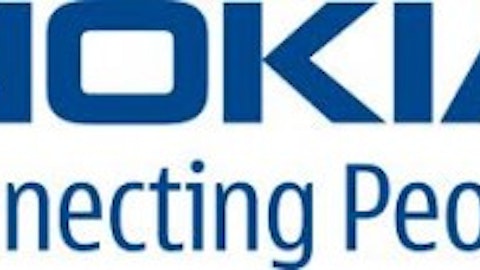Things haven’t been going Apple Inc. (NASDAQ:AAPL)‘s way recently. The company’s stock is down more than 11% since its quarterly earnings came out last month, and the stock has plunged more than 26% over the past six months. But Apple is just one company (albeit a very important one) in the mobile industry. Investors need not look much further than the inside of an Apple iPhone for solid investment ideas in the mobile industry.
The monarch of mobile
If Apple is a representative of the high-end smartphone market, then consider QUALCOMM, Inc. (NASDAQ:QCOM) the ambassador of the entire mobile industry. The company owns thousands of patents for 3G mobile data technologies and collects 3%-5% on every CDMA mobile device sold. Chew on that for a minute if you skimmed over it. Qualcomm brings in cash on every single mobile device that uses its patented 3G technology across the globe — and it doesn’t need to do a dang thing to collect it.
Newer devices are adopting the faster 4G technologies, which Qualcomm has some patents on as well, but the company doesn’t have much to fear when it comes to changing technology. Smartphones will be backward compatible with 3G for about another decade, allowing Qualcomm to receive licensing fees the entire time. That means for the next 10 years of mobile, no matter what new standards come out or new technologies are used, Qualcomm will make money off of those new products just as it does now. The company is expected to see licensing revenue grow by 18% in 2013 — a pretty sweet gig if you can get it.
Qualcomm is much more than a patent play, though. The company makes processors for high-end and low-end smartphones. Some of its latest chips are in the Nokia Corporation (NYSE:NOK) Lumia and the CDMA version of the Samsung Galaxy S III. It also makes mobile station modem — or MSM — chips for Apple, HTC, and others. Between its patents, processors, and MSM chips, Qualcomm is diversified within the mobile industry, and it succeeds with both the sales of Android and iOS smartphones.
Mobile is on the move
Right now, investors are paying about 18 times earnings for a piece of Qualcomm’s mobile diversification, while paying about 10 times earnings for Apple. Qualcomm may seem expensive compared to Apple, but think of the multipronged approach Qualcomm has in mobile. Qualcomm’s mobile diversification positions the company to profit from mobile’s new future — developing countries.
Three-quarters of the world now has access to mobile networks, and mobile growth in developing counties is in the double digits. Apple may have some problems in the near future adapting to the smartphone market in developing countries. Google Inc (NASDAQ:GOOG)‘s Android dominates about 70% of the smartphone’s worldwide, and Apple’s price point isn’t helping the situation.
A 16 GB unlocked iPhone 5 goes for $649, a hefty price even in the U.s. In developing countries, where most phones aren’t subsidized, paying for a new iPhone simply isn’t an option. According to smartphone executives at the Mobile World Congress last year, the estimated sweet spot for smartphones in the developing world is about $50. This is a problem for Apple, which has stuck with its high-end phones since inception, but isn’t much of an issue for Qualcomm. Qualcomm’s mobile diversification can be applied to low-end phones just as easily as high-end ones, leaving investors with much more growth potential as mobile continues to expand.
Apple isn’t stupid
I’ve dinged Apple on its focus on high-end approach because it’s important to note. But Apple is one the savviest tech companies around and, despite its recent earnings release, its iPad and iPhone sales prove the company knows a thing or two about mobile. It’s not too late for the company to get in on the developing mobile market. Talks of a cheaper iPhone have been around since at least 2011 when The Wall Street Journal reported an inexpensive iPhone was in the works.
When the iPod’s popularity grew, Apple expanded the line to hit a wide range of price points. It would be smart for the company to do the same with its iPhone. Apple gobbled up about 34% of U.S. smartphone market share last quarter and its dominance in this country can spill over into the developing countries, but it all depends on whether (and when) the company will bring a cheaper iPhone to market.
The better position
Right now, Qualcomm is primed to boom in the mobile environment. Its patent licensing, processors, and MSM chips are found in companies across the board — and across the globe. Qualcomm can expect new revenues from its patents as smartphone companies expand into new markets, and some of its processors have already been widely adopted into Android phones, the dominant mobile OS around the globe.
The article Apple Is Down, but This Smartphone Play Is Alive and Kicking originally appeared on Fool.com and is written by Chris Neiger.
Fool contributor Chris Neiger has no position in any stocks mentioned. The Motley Fool recommends Apple and Google. The Motley Fool owns shares of Apple, Google, and Qualcomm.
Copyright © 1995 – 2013 The Motley Fool, LLC. All rights reserved. The Motley Fool has a disclosure policy.






